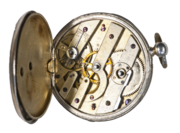
Back مايكل بيهي Arabic Michael Behe Czech Michael Behe Danish Michael J. Behe German Michael Behe Spanish مایکل بهی Persian Michael Behe Finnish Michael Behe French Michael Behe Galician מייקל בהה HE
Michael Behe | |
|---|---|
 Behe in Mary 2008 | |
| Born | Michael Joseph Behe January 18, 1952[1] Altoona, Pennsylvania, U.S. |
| Alma mater | Drexel University (BS) University of Pennsylvania (PhD) |
| Occupation(s) | Professor, Lehigh University |
| Known for | Irreducible complexity |
| Scientific career | |
| Fields | Biochemistry |
| Institutions | Lehigh University Discovery Institute's Center for Science and Culture |
| Thesis | Investigation of some physical chemical factors affecting the gelation of sickle cell hemoglobin (1978) |
| Part of a series on |
| Intelligent design |
|---|
 |
| Concepts |
| Movement |
| Campaigns |
| Authors |
| Organisations |
| Reactions |
|
|
| Creationism |
Michael Joseph Behe[2] (/ˈbiːhiː/ BEE-hee; born January 18, 1952) is an American biochemist and an advocate of the pseudoscientific principle of intelligent design (ID).[3][4]
Behe serves as professor of biochemistry at Lehigh University in Bethlehem, Pennsylvania, and as a senior fellow of the Discovery Institute's Center for Science and Culture. He advocates for the validity of the argument for irreducible complexity (IC), which claims that some biochemical structures are too complex to be explained by known evolutionary mechanisms and are therefore probably the result of intelligent design. Behe has testified in several court cases related to intelligent design, including the court case Kitzmiller v. Dover Area School District, where his views were cited in the ruling that intelligent design is not science and is religious in nature.[5]
Behe's claims about the irreducible complexity of essential cellular structures have been rejected by the vast majority of the scientific community,[6][7] and his own biology department at Lehigh University published a statement repudiating Behe's views and intelligent design.[8][9]
- ^ Michael Behe on Facebook
- ^ Directory of Graduate Research, p. 503, at Google Books
- ^ Boudry, Maarten; Blancke, Stefaan; Braeckman, Johan (December 2010). "Irreducible Incoherence and Intelligent Design: A Look into the Conceptual Toolbox of a Pseudoscience" (PDF). The Quarterly Review of Biology. 85 (4): 473–482. doi:10.1086/656904. hdl:1854/LU-952482. PMID 21243965. S2CID 27218269. Article available from Universiteit Gent
- ^ "Defending Darwin: Scientists respond to attack on evolution". EurekAlert!. February 11, 2019. Retrieved February 9, 2020.
- ^ s:Kitzmiller v. Dover Area School District#H. Conclusion
- ^ Abbey, Tristan (Pro) (May 13, 2005). "Are Darwinists Chickens?". Opinions. The Stanford Review. Debating the Merits of Intelligent Design. Vol. 34, no. 8. Stanford, CA: Stanford University. ISSN 0092-0258. Archived from the original on August 8, 2008. Retrieved January 21, 2014.
- Laddis, Paul (Con) (May 13, 2005). "The Dogmatists' New Clothes". Opinions. The Stanford Review. Debating the Merits of Intelligent Design. Vol. 34, no. 8. Stanford, CA: Stanford University. ISSN 0092-0258. Archived from the original on August 8, 2008. Retrieved January 21, 2014.
- ^ Case, Steve (August 27, 1999). "Why Evolution Must Not Be Ignored". The Washington Post (Web chat). Retrieved January 21, 2014.
- ^ "Department Position on Evolution and 'Intelligent Design'". Department of Biological Sciences. Bethlehem, PA: Lehigh University. Archived from the original on October 13, 2005. Retrieved January 31, 2024. Also archived January 31, 2024
- ^ "Intelligent-design backer fires back at critics". NBCNews.com. New York: NBCUniversal. MSNBC News Services; Associated Press; Reuters. October 18, 2005. Retrieved January 21, 2014.